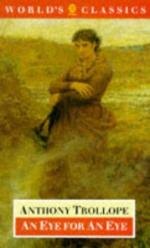“And what would you be?”
“Mr. Neville.”
“And what would her son be?”
“Oh;—just the same,—when he grew up. Perhaps there wouldn’t be a son.”
“God forbid that there should on those terms. You intend that your children and her children shall be—bastards. That’s about it, Mr. Neville.” The romance seemed to vanish when the matter was submitted to him in this very prosaic manner. “As to what you might choose to call yourself, that would be nothing to me and not very much I should say, to her. I believe a man needn’t be a lord unless he likes to be a lord;—and needn’t call his wife a countess. But, Mr. Neville, when you have married Miss O’Hara, and when your uncle shall have died, there can be no other Countess of Scroope, and her child must be the heir to your uncle’s title.”
“All that I could give her except that, she should have.”
“But she must have that. She must be your wife before God and man, and her children must be the children of honour and not of disgrace.” Ah,—if the priest had known it all!
“I would live abroad with her, and her mother should live with us.”
“You mean that you would take Kate O’Hara as your misthress! And you make this as a proposal to me! Upon my word, Mr. Neville, I don’t think that I quite understand what it is that you’re maning to say to me. Is she to be your wife?”
“Yes,” said Neville, urged by the perturbation of his spirit to give a stronger assurance than he had intended.
“Then must her son if she have one be the future Earl of Scroope. He may be Protesthant,—or what you will?”
“You don’t understand me, Father Marty.”
“Faith, and that’s thrue. But we are at the baich, Mr. Neville, and I’ve two miles along the coast to Liscannor.”
“Shall I make Barney take you round in the canoe?”
“I believe I may as well walk it. Good-bye, Mr. Neville. I’m glad at any rate to hear you say so distinctly that you are resolved at all hazards to make that dear girl your wife.” This he said, almost in a whisper, standing close to the boat, with his hand on Neville’s shoulder. He paused a moment as though to give special strength to his words, and Neville did not dare or was not able to protest against the assertion. Father Marty himself was certainly not romantic in his manner of managing such an affair as this in which they were now both concerned.
Neville went back to Ennis much depressed, turning the matter over in his mind almost hopelessly. This was what had come from his adventures! No doubt he might marry the girl,—postponing his marriage till after his uncle’s death. For aught he knew as yet that might still be possible. But were he to do so, he would disgrace his family, and disgrace himself by breaking the solemn promise he had made. And in such case he would be encumbered, and possibly be put beyond the pale of that sort of life which should be his as Earl of Scroope, by having Captain O’Hara as his father-in-law. He was aware now that he would be held by all his natural friends to have ruined himself by such a marriage.




